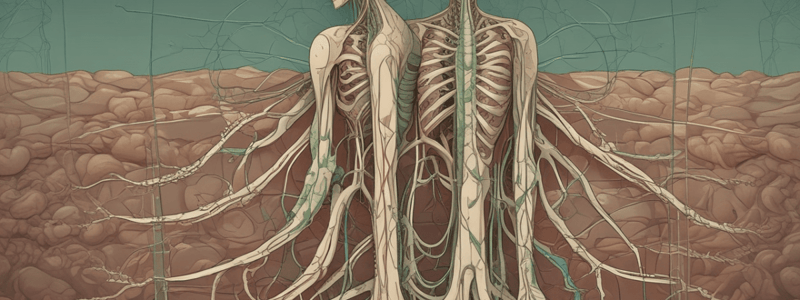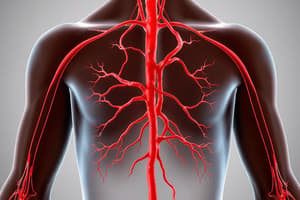Podcast
Questions and Answers
What is the clinical importance of intercostal veins?
What is the clinical importance of intercostal veins?
What is the function of the axillary lymph node groups?
What is the function of the axillary lymph node groups?
What is the significance of the pectoralis minor muscle in lymph node classification?
What is the significance of the pectoralis minor muscle in lymph node classification?
What is the primary hormonal stimulus for breast development and function?
What is the primary hormonal stimulus for breast development and function?
Signup and view all the answers
During which stage of life do physiological changes occur in the breast?
During which stage of life do physiological changes occur in the breast?
Signup and view all the answers
What is the purpose of dividing the axillary lymph nodes into levels?
What is the purpose of dividing the axillary lymph nodes into levels?
Signup and view all the answers
What is a condition characterized by the presence of extra breasts or nipples?
What is a condition characterized by the presence of extra breasts or nipples?
Signup and view all the answers
What is a condition in which the nipple is directed inward?
What is a condition in which the nipple is directed inward?
Signup and view all the answers
What is a type of breast disease that occurs in males?
What is a type of breast disease that occurs in males?
Signup and view all the answers
What is a chronic inflammatory condition of the breast?
What is a chronic inflammatory condition of the breast?
Signup and view all the answers
What is a condition characterized by the presence of multiple small breast tumors?
What is a condition characterized by the presence of multiple small breast tumors?
Signup and view all the answers
What is a type of breast disease that occurs during lactation?
What is a type of breast disease that occurs during lactation?
Signup and view all the answers
What is a condition characterized by the absence of breasts?
What is a condition characterized by the absence of breasts?
Signup and view all the answers
What is a type of breast disease characterized by the formation of cysts?
What is a type of breast disease characterized by the formation of cysts?
Signup and view all the answers
What is the term for a milk cyst in the breast?
What is the term for a milk cyst in the breast?
Signup and view all the answers
What is the primary purpose of performing duct galactography?
What is the primary purpose of performing duct galactography?
Signup and view all the answers
What is the appropriate treatment for a single duct bloody discharge?
What is the appropriate treatment for a single duct bloody discharge?
Signup and view all the answers
What is the term for a discharge from multiple ducts with no palpable or mammographic mass?
What is the term for a discharge from multiple ducts with no palpable or mammographic mass?
Signup and view all the answers
What is the purpose of estimating serum prolactin levels?
What is the purpose of estimating serum prolactin levels?
Signup and view all the answers
What is the likely cause of nipple discharge in a woman taking contraceptive pills?
What is the likely cause of nipple discharge in a woman taking contraceptive pills?
Signup and view all the answers
What is the term for a cyst that occurs due to the retention of acinar secretions?
What is the term for a cyst that occurs due to the retention of acinar secretions?
Signup and view all the answers
What is the first step in the investigation of nipple discharge?
What is the first step in the investigation of nipple discharge?
Signup and view all the answers
What is the surgical treatment for persistent and troublesome discharge?
What is the surgical treatment for persistent and troublesome discharge?
Signup and view all the answers
What is the name of the tumour that arises from the ductal epithelium?
What is the name of the tumour that arises from the ductal epithelium?
Signup and view all the answers
What is the name of the disease that begins in the epithelium of the nipple?
What is the name of the disease that begins in the epithelium of the nipple?
Signup and view all the answers
What is the term for the occurrence of a second breast cancer outside the breast quadrant of the primary cancer?
What is the term for the occurrence of a second breast cancer outside the breast quadrant of the primary cancer?
Signup and view all the answers
What is the percentage of cases where the lesion is bilateral in lobular carcinoma?
What is the percentage of cases where the lesion is bilateral in lobular carcinoma?
Signup and view all the answers
What is the term for the occurrence of a second cancer within the same breast quadrant as the primary cancer?
What is the term for the occurrence of a second cancer within the same breast quadrant as the primary cancer?
Signup and view all the answers
What is the most common histological type of breast cancer?
What is the most common histological type of breast cancer?
Signup and view all the answers
What is the risk factor for breast cancer that is mentioned in the text?
What is the risk factor for breast cancer that is mentioned in the text?
Signup and view all the answers
What percentage of breast cancers are Adenocarcinoma with productive fibrosis?
What percentage of breast cancers are Adenocarcinoma with productive fibrosis?
Signup and view all the answers
Which type of breast cancer accounts for 4% of all cases?
Which type of breast cancer accounts for 4% of all cases?
Signup and view all the answers
What is the main route of lymphatic spread in breast cancer?
What is the main route of lymphatic spread in breast cancer?
Signup and view all the answers
What is the name of the condition characterized by nipple changes and eczematous-like changes?
What is the name of the condition characterized by nipple changes and eczematous-like changes?
Signup and view all the answers
What is the term for the characteristic mammographic appearance of early breast cancer?
What is the term for the characteristic mammographic appearance of early breast cancer?
Signup and view all the answers
What is the term for the orange peel appearance of the breast skin?
What is the term for the orange peel appearance of the breast skin?
Signup and view all the answers
What is the percentage of breast cancers that are Invasive lobular carcinoma?
What is the percentage of breast cancers that are Invasive lobular carcinoma?
Signup and view all the answers
What is the name of the staging system used for breast cancer?
What is the name of the staging system used for breast cancer?
Signup and view all the answers
Study Notes
Intercostal Veins
- Drain into the azygos system and communicate with the valveless vertebral venous plexus (Batson's)
- This communication could explain the tendency of breast cancer deposits to affect the axial skeleton and central nervous system
Lymphatic Drainage
- Lymph vessels follow the course of blood vessels
- Six axillary lymph node groups:
- Axillary nodes (lateral)
- Anteromedial (pectoral; external mammary)
- Posterior (subscapular) group
- Central group
- Apical group (subclavicular)
- Interpectoral (Rotter)
Axillary Lymph Nodes
- Divided into three levels by the pectoralis minor muscle for prognosis after radical or modified radical mastectomy
- Level I nodes: located low in the axilla, lateral or below the lower border of the pectoralis muscle
- Level II nodes: located superficial or deep to the pectoralis minor muscle
- Level III nodes: located medial or above the muscle in the apex of the axilla
Physiology of the Breast
- Hormonal control: breast development and function are initiated by estrogen, progesterone, and prolactin
- Physiological changes occur at puberty, during menstruation, pregnancy, lactation, and after menopause
Congenital Anomalies
- Anomalies of the nipple
- Anomalies of the breast
- Accessory breasts (polymastia)
- Accessory nipples (polythelia)
- Inverted nipple
- Enlarged breasts
- Amastia
- Accessory axillary breast
Diseases of the Male Breast
- Gynecomastia
- Male breast cancer
Infectious and Inflammatory Disorders of the Breast
- Acute lactational mastitis and breast abscess
- Non-lactational mastitis
- Chronic inflammatory conditions of the breast
- Mammary duct ectasia (plasma cell mastitis)
- Chronic pyogenic breast abscess
- Hidradenitis suppurativa
- Tuberculosis of the breast
- Mondor's disease
ANDI Syndrome
- Fibrocystic disease of the breast, a spectrum of breast conditions that ranges from normal to disorder to disease
- Aberrations of Normal Development and Involution (ANDI)
- Three stages: early reproductive years (15-25 years), later reproductive years (25-40 years), and involution (35-55 years)
- Pathological types: adenosis, epitheliosis, fibrosis, cyst formation
Cysts of the Breast
- Acinar cysts
- Retention cysts
- Galactocele (milk cyst)
- Intra-cystic papilliferous carcinoma
- Interacinar cysts
Nipple Discharge
- Causes: duct ectasia, fibrocystic disease, duct papilloma, duct carcinoma, contraceptive pills, hyperprolactinaemia
Diagnosis
- History and examination should provide information on:
- Nature of discharge
- Association with a mass
- Unilateral or bilateral
- Single duct or multiple duct discharge
- Use of contraceptive pills
- Investigations:
- Test for occult blood in the discharge
- Cytology of the discharge for exfoliated cancer cells
- Soft tissue mammography
- Duct galactography
- Serum prolactin estimation in suspected cases of galactorrhoea
Treatment
- A palpable mass should be excised for histology and treated accordingly
- A single duct bloody discharge calls for excision of this duct by microdochectomy
- Discharge from multiple ducts with no palpable or mammographic mass is initially treated conservatively by observation
- Rarely, the discharge is persistent and troublesome, where it is surgically treated by excision of the major ducts
Breast Neoplasms
- Classification and benign tumours:
- Duct papilloma
- Fibroadenoma
- Cystosarcoma phylloides
Carcinoma of the Breast
- Aetiology:
- Risk factors
- Genetic factors (BRAC1 & BRACA2)
- Endocrinal factors (hormonal)
- Precancerous lesions
- Obesity
- Previous affection with breast cancer
- Epidemiology:
- Natural history
- Histopathology:
- Carcinoma may arise from the lobules, ducts, or nipple
- Types:
- Carcinoma of the ducts
- Carcinoma of the lobules
- Paget's disease of the nipple
- Multicentricity and multifocality
- Classification of invasive carcinoma:
- Paget's disease of the nipple
- Invasive ductal carcinoma
- Adenocarcinoma with productive fibrosis (scirrhous, simplex, no special type; NST)
- Medullary carcinoma
- Mucinous (colloid) carcinoma
- Papillary carcinoma
- Tubular carcinoma
- Invasive lobular carcinoma
- Rare cancers (adenoid cystic, squamous cell, apocrine)
Spread
- Local spread
- Lymphatic spread (by embolism and permeation)
- Blood stream spread
Hormone Receptors
- Oestrogen
- Progesterone
Studying That Suits You
Use AI to generate personalized quizzes and flashcards to suit your learning preferences.
Related Documents
Description
This quiz covers the lymphatic system, including the course of lymph vessels and axillary lymph node groups, as well as the importance of intercostal veins in draining into the azygos system and communicating with the vertebral venous plexus.


